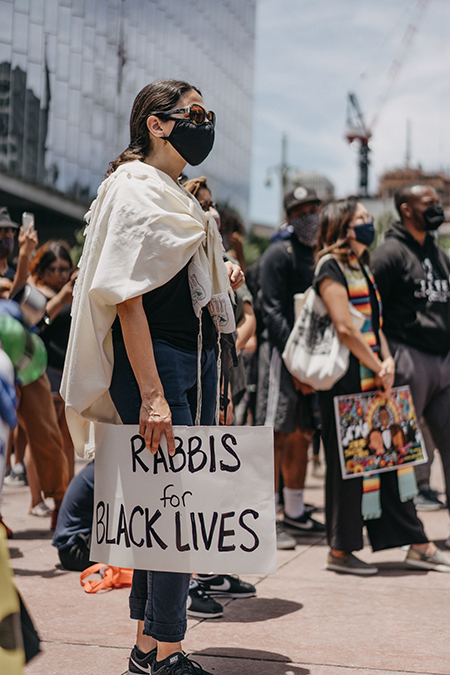Being Jewish
A Time for Moral Reimagining

This moment of aching and awakening demands that we cultivate a new moral imagination.
The intersection of global health crisis and national social upheaval might seem like a strange starting point for creative, generative thinking. We’re tired, scared, angry and more aware of our vulnerability than ever before. But I now think of the world before the spring of 2020 as the world as it was and the time after as the world as it could be. And for us to achieve the world as it could be, we will need to seize this moment, with all its vulnerability, and dream big.
Shabbat beckons us to that dreamscape every week, with its rhythmic call to pause, reflect and imagine. But Shabbat is a specifically Jewish individual and communal practice, not a societal one. The world barrels ahead whether we’re on the right track or wrong one. It’s almost unthinkable to envision a whole society pausing for deep, collective reflection and regeneration.
Yet in the time of Covid-19, global commerce essentially halted for months. Hundreds of millions of kids around the world stayed home from school. Freeways and public squares stood empty. The world pressed pause.
In early March, as we all clamored to translate our services and programs into virtual opportunities for connection and enrichment, my IKAR colleague Rabbi Keilah Lebell had this warning: Though our express train has screeched to a halt, before rushing to build a new train—virtual or otherwise—what might we hear if instead we stop for a moment to listen and learn? And my dear friend Valarie Kaur, a Sikh civil rights lawyer and activist, called on us to get quiet and summon our deepest wisdom—and to let that wisdom lead us. So I tried to get still. To listen and to learn.
Then, just as we began to attune our hearts to inner wisdom, the uprising following the murder of George Floyd brought a surge of life back to our streets. Suddenly, massive protests erupted in every state and nearly every major city. A veil lifted: A call to justice for black Americans, embraced by people of all races, ages and faiths, is laying bare the gross inequities and disparities of our systems and the perverseness and pervasiveness of the racism in our society.
Spiritual whiplash: Nearly three months of unnatural quiet culminated in a sustained piercing, aching cry from the street—a collective expression of rage, trauma and grief. The instinct in times of upheaval is to try to return to normal as quickly as possible. But there is no going back. The deafening collision of two national wake-up calls demands a new kind of moral imagining.
But the burden and opportunity of our time is not only on lawmakers and city officials, but also on rabbis and educators, day school heads and communal leaders. As a Jewish community, we must consider: What values and vision will guide us through this unfamiliar terrain? What narratives have we embraced, and what have we willfully ignored? Who have we marginalized? Can we design communal priorities and commit resources in affirmation of our most foundational theological claim, that every human being is created in God’s own image?
This is the time to envision our most robust selves. From the stillness and from the thunder: What have we learned? Where do we stand?
The Slonimer Rebbe, Rabbi Sholom Noach Berezovsky, who passed away in 2000, wrote that every period in history carries with it a unique mission, and that every generation needs to reflect deeply to determine what that mission is. “This generation,” he wrote, “calls us to great things.”
The hour demands of us bravery and honesty. For reasons we don’t fully comprehend, our generation has been given the opportunity for courageous, imaginative thinking that can transform our Jewish community and this country. It is my deepest prayer that as we lay to rest the world as it was, we cultivate a moral imagination worthy of the world as it could be.
Rabbi Sharon Brous is founder and senior rabbi of IKAR in Los Angeles.










 Facebook
Facebook Instagram
Instagram Twitter
Twitter
Leave a Reply